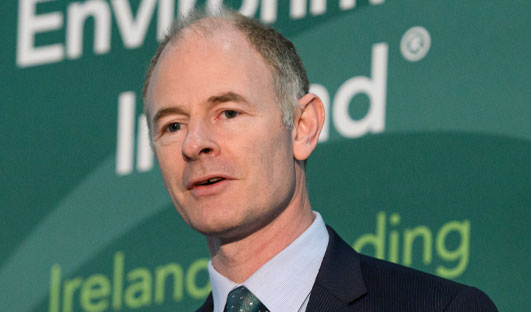Climate: Comprehensive and impactful transformation

Minister of State with special responsibility for communications and circular economy, Ossian Smyth TD, discusses the need for “comprehensive and impactful transformation” and outlines the key areas for government action.
Smyth is under no illusion that collaborative transformation is required if Ireland is to honour its commitment and play its part in holding global temperature increases to 1.5OC, as agreed and re-affirmed under the Paris Agreement.
Alongside action to change by government, business, academia, and communities, he says: “Meeting our climate goals will also require changes in individual behaviours, including how we work, heat our homes, travel, consume goods and services, and manage our waste.”
He adds: “Delivering this is the responsibility of everyone in society.”
Speaking about the range of policies and actions both being implemented and under development, the Minister of State believes that renewable electricity can drive the decarbonisation of society, create economic opportunities, and ensure a secure and sustainable energy system.
“Securing our energy supplies and delivering on our climate targets are inextricably linked,” he states. “While Ireland has made significant progress towards the deployment of renewable electricity, we must do much more and we must do it quickly.”
Away from generation, he states that the Government is supporting investment in energy efficiency practices through the provision of incentives such as carbon pricing and decarbonising industrial heat to support the enterprise sector.
“To decarbonise industrial heating, we are encouraging the uptake of heat pumps and alternative fuels through the Support Scheme for Renewable Heat as well as developing policy around incoming technologies such as zero emissions gases.
“We are working across government and with public bodies to provide businesses with the supports they need to invest in energy efficient practices.”
In relation to agriculture, the single largest contributor to overall emissions in the country, Smyth acknowledges that the sector must make a positive contribution to the transition to a climate resilient and low carbon society, if Ireland is to meet its reduction targets.
The Climate Action Plan commits to a reduction of agriculture-related emissions of between 22 to 30 per cent by 2030 and Smyth says that the core measures to deliver on this will offer farmers ways to reduce carbon emissions at farm level, by becoming more efficient, while being offered opportunities to diversify their agricultural activities.
“Further measures will be developed over the coming years which will achieve this reduction by 2030 and set our society on the path toward climate neutrality by 2050,” he states.
Just transition
Emphasising that a just transition sits at the core of the climate action plans, Smyth says that these principles will not only guide policy making and implementation in the coming years in monitoring and managing the transition but also enable response to future transition challenges and help target the areas in need of support.
Highlighting the commitment in the Climate Action Plan of a Just Transition Commission, the Minister of State says that the commission will make periodic recommendations to government, building on research, engagement through the National Dialogue on Climate Action, and the annual review from the Climate Change Advisory Council, on how government policy can further the just transition.
Pointing to the €60 million allocated by Minister Eamon Ryan TD from the Climate Action Fund for community climate action projects in November 2021, Smyth says that transition to a carbon neutral economy “will provide huge opportunities to foster innovation, create new jobs and grow businesses in areas like offshore wind, cutting-edge sustainable agriculture, and low carbon construction”.
“While we all must act together towards our climate objective, I realise that the costs of climate action will be more acutely felt by some than others,” he states.
International and EU policy
The Minister of State stresses that the climate crisis is a global affair, highlighting that international collaboration is key to determining a greener, healthier, and safer future for all.
“We must move forward from a place of extraction to one of rehabilitation, while ensuring no one is left behind,” he says. “Ireland is committed to a scaled up just transition to alternative energy systems and divestment from harmful fossil fuels for a greener, healthier future.”
Achievement will require not only international cooperation, but increased financial flows, Smyth says, outlining Ireland’s commitment at COP26 to providing €225 million per year to developing countries by 2025.
“Effective climate finance should support people in developing countries to prepare for a climate resilient future in terms of mitigation, adaptation and addressing loss and damage. However, these decisions must be led by the most affected, and Ireland will continue to amplify these voices in negotiations in recognition of the disproportionate impact they are facing from climate change, right now.”
He concludes: “Climate change is the single greatest challenge we face as a country and as a planet, it does not affect all people, countries or regions equally, but it will take everyone, working in unison, to meet our goals and help protect future generations.”





